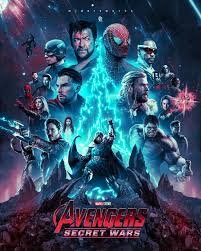The Legacy of Avengers: Secret Wars in Marvel Comics
The concept of Secret Wars traces back to 1984 when Marvel Comics launched the first-ever company-wide crossover event. Originally conceived as a toy marketing strategy, the 12-issue series Marvel Super Heroes Secret Wars became a cultural phenomenon, introducing iconic moments like Spider-Man’s black suit (which later became Venom). The 2015 revival, Secret Wars by Jonathan Hickman, redefined the storyline as a multiversal collapse, where Doctor Doom reshaped reality as a god. This version is the primary inspiration for the MCU adaptation, blending high-stakes storytelling with deep character arcs. Few fans realize that the 2015 event was initially planned as Avengers vs. X-Men, but Marvel pivoted to Secret Wars to capitalize on the multiverse trend—a decision that now perfectly aligns with the MCU’s Phase 6 trajectory.
How the MCU Is Adapting Avengers: Secret Wars
Marvel Studios confirmed Avengers: Secret Wars as the finale of the Multiverse Saga, set for release in 2027. Unlike Endgame, which focused on time travel, Secret Wars will explore the merging and destruction of alternate realities, potentially bringing together variants of beloved characters. Kevin Feige has hinted that the film will incorporate elements from both the 1984 and 2015 comic arcs, with Kang the Conqueror (or his variants) replacing Doctor Doom as the central antagonist. Leaked production notes suggest that the movie will feature incursions—a concept introduced in Doctor Strange in the Multiverse of Madness—where colliding universes face annihilation. This setup allows Marvel to soft-reboot the franchise, integrating Fox’s X-Men and Fantastic Four into the MCU seamlessly.
The Hidden Influence of loki and What If
Many viewers overlook how Disney+ series like Loki and What If…? laid the groundwork for Secret Wars. The Time Variance Authority (TVA) and He Who Remains (a Kang variant) established the fragility of the multiverse, while What If…? introduced the concept of the Watcher overseeing alternate timelines. The Season 2 finale of Loki, where Loki becomes the guardian of the multiverse, directly sets up the chaos Kang will unleash. Additionally, rumors suggest that What If…? Season 3 will adapt Secret Wars’ “Battleworld” arc, where fragments of destroyed universes merge into a patchwork planet ruled by a dictator—likely Kang or Doom. This interconnected storytelling is Marvel’s most ambitious narrative experiment yet.
Why Secret Wars Is Bigger Than Endgame
While Avengers: Endgame was a cultural milestone, Secret Wars has the potential to surpass it in scope and impact. The multiverse allows for the return of legacy actors like Hugh Jackman’s Wolverine and Tobey Maguire’s Spider-Man, alongside current MCU heroes. Industry insiders report that Marvel is negotiating with past franchise stars, including Robert Downey Jr. and Chris Evans, for variant cameos. Beyond nostalgia, Secret Wars will likely culminate in the introduction of mutants into the MCU, resolving the long-standing X-Men integration problem. The film’s stakes are also higher—instead of reversing a snap, heroes will battle to prevent total multiversal destruction, a theme that resonates in an era of heightened existential anxieties.
The Business Strategy Behind Avengers: Secret Wars
Marvel’s parent company, Disney, views Secret Wars as a financial and thematic reset for the MCU. Post-Endgame, the franchise faced criticism for inconsistent quality and superhero fatigue. By adapting Secret Wars, Marvel can streamline its sprawling multiverse into a cohesive new status quo, similar to DC’s Crisis on Infinite Earths. The film is also a merchandise goldmine; the “Battleworld” setting allows for countless variant action figures, while the storyline’s scale justifies a two-part release (though Marvel has yet to confirm this). Analysts predict Secret Wars could become the highest-grossing superhero film ever, surpassing Avatar, if it successfully balances fan service with innovative storytelling.
Controversies and Challenges Facing Avengers: Secret Wars
Despite its potential, Secret Wars faces significant hurdles. Jonathan Majors’ legal troubles forced Marvel to reconsider Kang’s role, with rumors suggesting Doctor Doom may replace him as the primary villain. Additionally, the multiverse concept risks alienating casual viewers if not executed clearly—a lesson learned from Doctor Strange 2’s mixed reception. Another challenge is pacing; with over 30 MCU projects preceding Secret Wars, the film must avoid feeling overcrowded. Marvel’s solution may involve prelude Disney+ series, similar to The Marvels’ tie-ins, to streamline exposition.
The Cultural Significance of Avengers: Secret Wars
Beyond box office numbers, Secret Wars represents a turning point for superhero cinema. It’s the first mega-crossover to fully embrace the multiverse, a narrative device growing in popularity (Everything Everywhere All At Once, Spider-Verse). The film also reflects modern anxieties about fractured realities and identity—themes that resonate in a post-pandemic, digitally fragmented world. Culturally, Secret Wars could legitimize comic book movies as auteur-driven art, especially if Marvel recruits visionary directors like Sam Raimi or Ryan Coogler to helm segments.
What to Expect After Avengers: Secret Wars
Secret Wars won’t just conclude the Multiverse Saga—it will redefine the MCU’s future. Feige has teased a “soft reboot,” where key characters like Spider-Man and the Fantastic Four persist, while older heroes pass the torch. The X-Men’s official debut is all but confirmed, and the Young Avengers may emerge as the new core team. Behind the scenes, Marvel is investing in AI-driven de-aging technology to facilitate legacy actor returns, a move that could revolutionize Hollywood. Ultimately, Secret Wars isn’t just a movie; it’s Marvel’s gamble on the next decade of storytelling.
Go to main page


